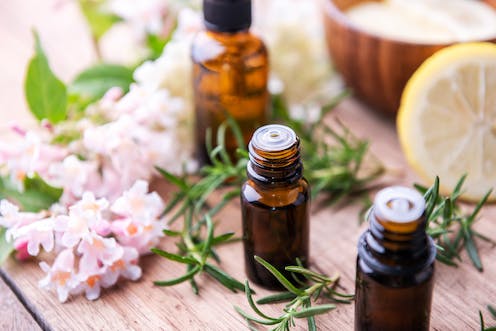
The history of using essential oils and their aromas to improve health and well-being dates back thousands of years. Like today, patients would inhale or topically apply these oils, which were typically extracted from plants – from leaves to flowers to roots to bark.
But not until the 1930s was this form of therapy considered to have true potential in mainstream health care. That was when Rene Maurice Gattefossé, a French chemist who coined the word aromatherapie, wrote extensively about the properties of essential oils.
Today, depending on whom you talk to, aromatherapy comprises anything from pleasant odors associated with personal hygiene and cleaning products to a serious therapy practiced by aromatherapists.
As a nurse and educator for more than 30 years, I’ve taught nursing students everything from intensive care to end-of-life support. Since becoming an aromatherapist in 2016, I’ve tried to determine how this practice could fit into the health care community and how hospitals and clinics might use aromatherapy as adjunct support for different kinds of ailments.
Table of Contents
Medical skepticism, public acceptance
Aromatherapy is not approved by the U.S. Food and Drug Administration for treatment of any medical condition. This is one reason why many clinicians are reluctant to use aromatherapy in their practice. They also say there’s not sufficient evidence to show that it works – nor do most have any training in aromatherapy.
Conversely, public acceptance of aromatherapy has never been higher. But this is not always a good thing. Although information about aromatherapy abounds on the internet, many of the claims are based on personal experience. This is not scientific evidence.
Yet millions of Americans subscribe to expensive multilevel marketing strategies that seem to suggest anything and everything is treatable with essential oils. But as with any substance, there are risks as well as benefits to using them – and sometimes, the information found online neglects to mention those risks.
Studies are not convincing
Though studies supporting the efficacy of aromatherapy are increasingly visible in peer-reviewed journal articles, they do not always stand up to scrutiny. In my own research, I have found that many studies on aromatherapy are flawed.
Here are just some of the problems: Exactly which essential oil was used is often not mentioned in these studies. How much essential oil was used, and for how long, is not always accurately described. The qualifications of the practitioner are frequently missing. Study participants may have a poor sense of smell, or a personal aversion to certain smells, which could skew results. The studies don’t always provide clear explanations on how they control for bias. Some have few participants, and many are done only on animals.
Also, some essential oils have many varieties; for example, some types of lavender may have calming properties, yet others are known for clearing of the sinuses. This is a critical distinction that may not be understood by the authors of these studies.
The good news: Efforts are underway to improve the quality of research, and the future for this therapy appears promising.
https://youtube.com/watch?v=kS9Gt40bTWQ&wmode=transparent&start=0
Potential treatments
According to the National Cancer Institute, a growing body of studies shows aromatherapy can improve the physical, mental and spiritual well-being of cancer patients and help reduce anxiety, nausea and vomiting.
The National Center for Complementary and Integrative Health notes that essential oils may be used for insomnia, pain, anxiety and for cancer treatment – though, again, rigorous research is lacking.
Researchers are exploring whether aromatherapy can help dementia and substance use disorder patients.
A 2021 meta-analysis of clinical trials revealed that the essential oil bergamot can reduce anxiety in humans. Based on this, it is reasonable to think that using bergamot via inhalation may reduce anxiety. It is also “generally recognized as safe” by the FDA.
The Aromatic Research Quality Appraisal Taskforce was founded in 2021 and has created a checklist to assess the quality of aromatherapy studies. This is foundational work to try to get aromatherapy research up to the highest standards.
Easy to use
Inhalation of the essential oil often incorporates aroma sticks – small cylinder-shaped tubes about the size of a lipstick container with a wick containing essential oils – or patches worn by the patient, or diffusers using either cool water vapor or ultrasonic dispersal.
For topical applications, essential oils do not dissolve in water, so use of a vegetable or other oil is necessary to dilute and decrease their concentration.
But before introducing essential oils into your life, you first have to find accurate information about them. There are professional organizations working to maintain a standard of practice for aromatherapy.
There is nothing wrong with searching for natural and clean products that might help you. This is why so many people are attracted to beautiful essential oils and their lovely aromas. Just remember that natural and beautiful does not mean they work – or that the oils are without risk.
![]()
Disclosures: Dr. Marian Reven is founder and president of the Aromatic Research Quality Appraisal Taskforce (ARQAT) and Principal Investigator on the study involving bergamot and substance use disorder at WVU for which she received grant funding through the Rosenthal Riter Scholarship Fund and the Ruth and Robert Kuhn Nursing Faculty Research Award. Dr. Reven is an Assistant Professor of Clinical Education at WVU School of Nursing, is a Registered Aromatherapist, on the Executive Committee of the Alliance of International Aromatherapists (AIA) and is the chair of the AIA Research Committee.























